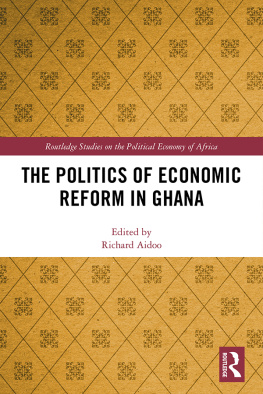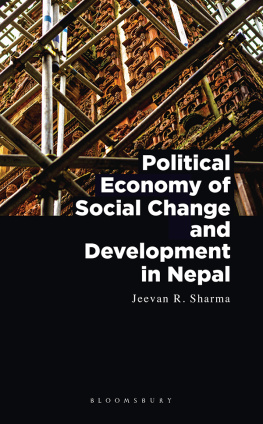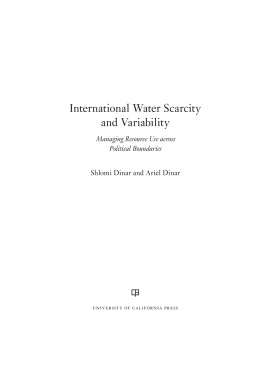AFRICAN ETHNOGRAPHIC STUDIES
OF THE 20TH CENTURY
Volume 43
THE CHANGING ECONOMY OF THE
LOWER VOLTA 195467
THE CHANGING ECONOMY OF THE
LOWER VOLTA 195467
A Study in the Dynanics of Rural
Economic Growth
ROWENA M. LAWSON
First published in 1972 by Oxford University Press for the International African Institute.
This edition first published in 2018
by Routledge
2 Park Square, Milton Park, Abingdon, Oxon OX14 4RN
and by Routledge
711 Third Avenue, New York, NY 10017
Routledge is an imprint of the Taylor & Francis Group, an informa business
1972 International African Institute
All rights reserved. No part of this book may be reprinted or reproduced or utilised in any form or by any electronic, mechanical, or other means, now known or hereafter invented, including photocopying and recording, or in any information storage or retrieval system, without permission in writing from the publishers.
Trademark notice: Product or corporate names may be trademarks or registered trademarks, and are used only for identification and explanation without intent to infringe.
British Library Cataloguing in Publication Data
A catalogue record for this book is available from the British Library
ISBN: 978-0-8153-8713-8 (Set)
ISBN: 978-0-429-48813-9 (Set) (ebk)
ISBN: 978-1-138-59111-0 (Volume 43) (hbk)
ISBN: 978-0-429-49063-7 (Volume 43) (ebk)
Publishers Note
The publisher has gone to great lengths to ensure the quality of this reprint but points out that some imperfections in the original copies may be apparent.
Disclaimer
The publisher has made every effort to trace copyright holders and would welcome correspondence from those they have been unable to trace.
The
Changing Economy
of the
Lower Volta
195467
A study in the Dynamics of
Rural Economic Growth
ROWENA M. LAWSON
Senior Research Fellow, University of Leeds
Formerly Senior Lecturer, University of Ghana
Based on research undertaken under the auspices
of the Volta Basin Research Project, University
of Ghana
Published for the
INTERNATIONAL AFRICAN INSTITUTE
by
OXFORD UNIVERSITY PRESS
LONDON NEW YORK TORONTO
1972
TO PENNY AND LAWRENCE
Contents
Oxford University Press, Ely House, London W. 1
GLASGOW NEW YORK TORONTO MELBOURNE WELLINGTON
CAPE TOWN SALISBURY IBADAN NAIROBI DAR ES SALAAM LUSAKA ADDIS ABABA
BOMBAY CALCUTTA MADRAS KARACHI LAHORE DACCA
KUALA LUMPUR SINGAPORE HONG KONG TOKYO
ISBN 0 19 724188 3
International African Institute 1972
Typeset by H. Charlesworth & Co. Ltd., Huddersfield.
Printed in Great Britain by
Redwood Press Ltd. Trowbridge, Wiltshire
TABLES
MAP
Lower reaches of Volta River, Akusu-Ada, before 1964
The field work for this study was mainly undertaken in the Lower Volta, Ghana, first in 1954 and later over the period 196467. The work of collecting data for the latter period was financed by the Rockefeller Foundation and the main purpose was to make a study of rural economic growth over a ten year period, 195464, using as benchmark data, material collected by the author in 1954 in the course of a study of the economy of the Lower Volta undertaken for the Volta River Project Preparatory Commission. This Commission was appointed by the British Government in 1952 to undertake preparatory work for the proposal to exploit local bauxite deposits and to develop large scale aluminium production using hydroelectric power from the proposed Volta dam. This scheme, which would have involved Canadian and British aluminium producers and the British and Gold Coast Governments, was finally abandoned in 1956.
I would like to thank Sir Robert Jackson who was Director of the V.R.P.P.C., for his permission to use data collected whilst I was employed by the Commission. I would also like to thank the Rockefeller Foundation for financial support for the field work undertaken since 1964. The Food Research Institute, Stanford University generously gave facilities for the analysis and writing up of the data and the author would like especially to thank all those members of the Institute who gave valuable criticism and help during her employment as Associate Professor at Stanford, in particular Dr W. O.Jones, Dr Carl Eicher and Dr John Jamison.
Some aspects of this study were introduced in the discussions at the International African Seminar on The Development of Indigenous Trade and Markets in West Africa, held under the auspices of the International African Institute at Fourah Bay College, Sierra Leone, in December 1969. Thanks are due to the Institute for undertaking its publication.
The University of Leeds has also assisted towards the publication of this monograph and their generosity is acknowledged. Thanks must also go the Volta Basin Research Project, University of Ghana, under whose aegis this work was carried out and which also gave some financial help, and to Walter Pople, Zoology Department, for his unstinting help in innumerable ways in the field.
This study would not have been possible without the assistance of a large number of recorders and research assistants in the field. They are too many to mention by name but I would like to thank them all for their patience and persistence in working under difficult physical conditions in an area which, at the time, was fairly remote.
Lastly, I would like to thank the people of Battor, the chief and elders and the local council officers who suffered our observations and enquiries for so long.
Rowena M. Lawson
University of Leeds
January 1971
The purpose of this study is to examine the process of growth of a rural economy in Ghana over a period of fourteen years from 195467 based on an empirical study. During these years the economy under observation moved from the static traditional Schultzian-type equilibrium (Schultz, 1964, chapters 1 and 2), which had been confined by a closely knit socio-economic matrix, into a transitory phase of economic growth in which earlier constraints were broken down to make way for a more sensitive response to economic opportunity. It cannot be said however that by 1967 self-sustaining economic growth had been achieved. This study is an attempt to assess the factors which disturbed the static equilibrium of this rural economy and enabled it to move to a higher level of economic activity.
Field data were obtained by a combination of regular statistical recording and data collection, and also by close observations made during periods of residence in the village of Battor between 1954 and 1967. The amount of quantitative data collected will be obvious from the empirical data presented here, but it is most important to stress that the understanding and interpretation of this material would not have been possible without close observations of the socio-cultural changes which were occurring simultaneously over this period. This study represents the first examination of the interaction of socio-economic variables at a micro level over a significant period of economic change.











